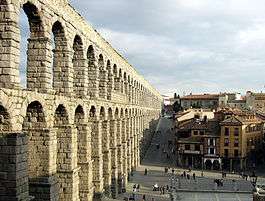Aqua Tepula
The Aqua Tepula is an ancient Roman aqueduct built in 126 BC by censors G. Servilius Caepio and L. Cassius Longinus. Its source was at the Alban hills, running only a mere 18 kilometers to Rome. The water from the Aqua Tepula, as implied in the name, was tepid and lukewarm, and thus was, as Frontinus states, not fit for human consumption.
Problems
The Aqua Tepula's waters were, as stated by Frontinus, lukewarm. In 33 BC, M. Viscus Agrippa attempted to cool its waters by mixing the Aqua Tepula's waters with that of a recent aqueduct, the Aqua Julia. The water was mixed in a clearing basin then was split into two lines that reached separate termini. Both were superimposed on the Marcia, the Tepula being the highest, thus able to deliver water over many parts of the city. The cost of the Tepula and the poor quality of its water limited its success. The smallest aqueduct, it delivered 17,800 cubic meters per day, a scant amount in Roman times. This made the aqueduct not extremely useful, but it still provided water for the city of Rome
See also
External links
| Wikimedia Commons has media related to Aqua Tepula (Rome). |
